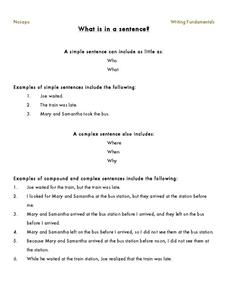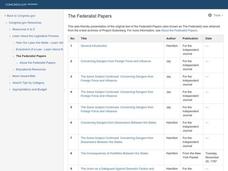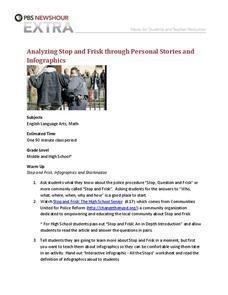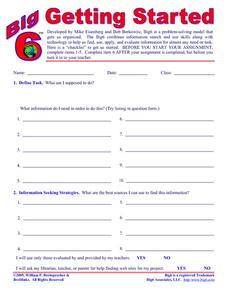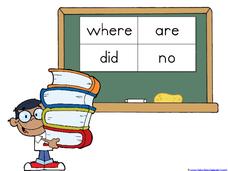Syracuse City School District
Summary of Fiction and Non-Fiction Text
Somebody Wanted But So Then (SWBST)? Yes! Here's a great strategy for teaching young readers how to summarize narrative text. In addition, the packet includes exercises that show kids how to summarize nonfiction text using the classic...
Student Handouts
The Five W's and How
Here is a great graphic organizer for ensuring that young researchers and writers cover all their bases when brainstorming a topic by considering the five W's (who, what, where, when, and why) and how.
Newseum
Putting the Consumer's Questions to Work
Who, what, when, where, why, and how are good questions to ask when evaluating a source. First, scholars find two sources of information relating to a chosen topic. Next, pupils complete a worksheet to gauge the source's credibility....
Read Works
American Government Preamble to the United States Constitution
Observe Constitution Day with a worksheet that delves deep into the who, what, why, when, where, and how of the U.S. Constitution. Scholars read a short informational text then answer 10 questions—short answer and multiple choice.
Teaching Tolerance
Reflection: What’s Your FRAME?
Encourage your class to recognize the diversity in the beliefs and backgrounds of their peers. Learners use the acronym FRAME to consider culture, background, and life experiences.
Nosapo
Family Titles, Pronouns, Writing about a Person
How is your grandmother related to you? How is your cousin related to your grandmother? Learn about family relationships and pronouns with an activity that guides pupils to write two short narratives about members of their families.
Nosapo
What Is in a Sentence, Paragraph, and Story?
Language arts is made up of many parts. Learners review the parts of a sentence, as well as how to make a simple sentence into a complex sentence, before examining full paragraphs and identifying the topic, body, and concluding sentence...
Read Works
How to Say “I Ruff You”
Who says you need a human to be your valentine on Valentine's Day? Give your dog-loving readers an inspiring perspective on how a sister givdes her brother a valentine from the family dog. They then answer 10 questions thatd involve...
K12 Reader
Point of View: Who Is Telling the Story?
See how famous books of literature have different perspectives with a short worksheet. After reviewing the difference between first and third person points of view, learners look over six passages from various novels and decide which...
Worksheet Web
Interrogatives and Auxiliary Verbs
Interrogatives—who, what, where, when, why, and how—are the focus of a grammar activity that reinforces writing questions and using auxiliary verbs.
Poetry4kids
How to Write a Fractured Nursery Rhyme
Scholars take a popular song or nursery rhyme and make it their own as they write a fractured nursery rhyme. Writers seek out a nursery rhyme's rhyming words and change them to create an original poem.
Dorling Kindersley
Question Words
Teaching your primary learners how to ask questions? Then look no further. This worksheet introduces the six essential question words: who, what, where, when, why, and how. Children begin by practicing how to write these words, before...
K5 Learning
The Blind Men and the Elephant
Sometimes it's necessary to view the whole picture before making a judgment about a small part. Read a short story about five blind men who try to identify an elephant by feeling different parts and coming to their own conclusions....
Facing History and Ourselves
Life for German Youth in the 1930s: Education, Propaganda, Conformity, and Obedience
The German youth faced an onslaught of propaganda when they went to school, thanks to the Nazi regime led by Hitler during World War II. Pupils relate their education experiences to German youth by analyzing primary source readings,...
Harper Collins
Amazing Women
Helen Keller became a teacher after her experience with Anne Sullivan, demonstrating to the world how valuable a dedicated mentor and determined spirit can be when overcoming adversity. Middle schoolers learn more about the influential...
PBS
Analyzing Stop and Frisk Through Personal Stories and Infographics
How much can you learn about an important topic from a single image? High schoolers analyze an infographic that represents the number of stops performed during the Stop and Frisk police procedure. After building background information...
Mathematics Vision Project
Module 6: Congruence, Construction, and Proof
Trace the links between a variety of math concepts in this far-reaching unit. Ideas that seem very different on the outset (like the distance formula and rigid transformations) come together in very natural and logical ways. This unit...
Federal Trade Commission
A Smarter Consumer
How can understanding advertisements make people better consumers? With the fourth and final instructional activity from the Admongo series on advertising, scholars reflect on some of the questions they may ask about an ad before making...
William P. Breitsprecher & Breitlinks
Getting Started
Set your pupils up for successful completion of projects with a six-step process to help with planning, time management, and reflection. Individuals fill out the first five sections of this handout before they begin their projects,...
Teach-nology
Being a Comedian Isn’t All Laughs
What's it like to be a comedian? Find out with a short cloze passage about the life of a comedian. Kids use eight words at the bottom of the page to fill in the blanks throughout the passage.
K12 Reader
Community Connections
Who helps our community run smoothly? Read a short passage about community members and helpers. After kids finish the passage, they answer five short questions on the other side of the page.
1 plus 1 plus 1 equals 1
I Can Read! Sight Words Set #10
Focus on sight words with a series of worksheets for beginning readers. Kids can work on where, are, did, and no with matching games and tracing activities, and many more.
Classics for Kids
Listen to the Music
Different pieces of music can elicit different emotions from audience members. A quick tempo can make you feel happy, while a largo piece may bring out a melancholy temperament. Elementary musicians learn more about the instruments and...
Skills USA
Personal Growth and the Personal Leadership Inventory
What are employers looking for in prospective employees? Career-minded high schoolers examine their strongest technical skills as well as important 21st century skills, including leadership, empathy, clear communication, working well...








